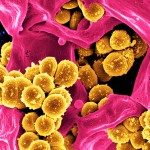Lien vers Pubmed [PMID] – 19275934
Cell. Signal. 2009 Jul;21(7):1135-42
G15 is a heterotrimeric G protein of the Gq/11 family. In this study, we describe its exceptional poor sensitivity to the general regulatory mechanism of G protein-coupled receptor (GPCR) desensitization. Enhancing beta2 adrenergic receptor desensitization by arrestin overexpression, did not affect signalling to G15. Similarly, increased levels of arrestin did not affect G15 signalling triggered by the activation of V2 vasopressin and delta opioid receptors. Furthermore, co-immunoprecipitation experiments showed that G15 alpha subunit (as opposed to Galphaq and Galphas) is recruited to a V2 vasopressin receptor mutant that is constitutively desensitized by beta-arrestin. Interestingly, co-expression of Galpha15 partially rescued cell surface localization and signalling capabilities of the same mutant receptor and reduced beta2 adrenergic receptor internalization. Taken together, these findings provide evidence for a novel mechanism whereby GPCR desensitization can be bypassed and G15 can support sustained signalling in cells chronically exposed to hormones or neurotransmitters.
